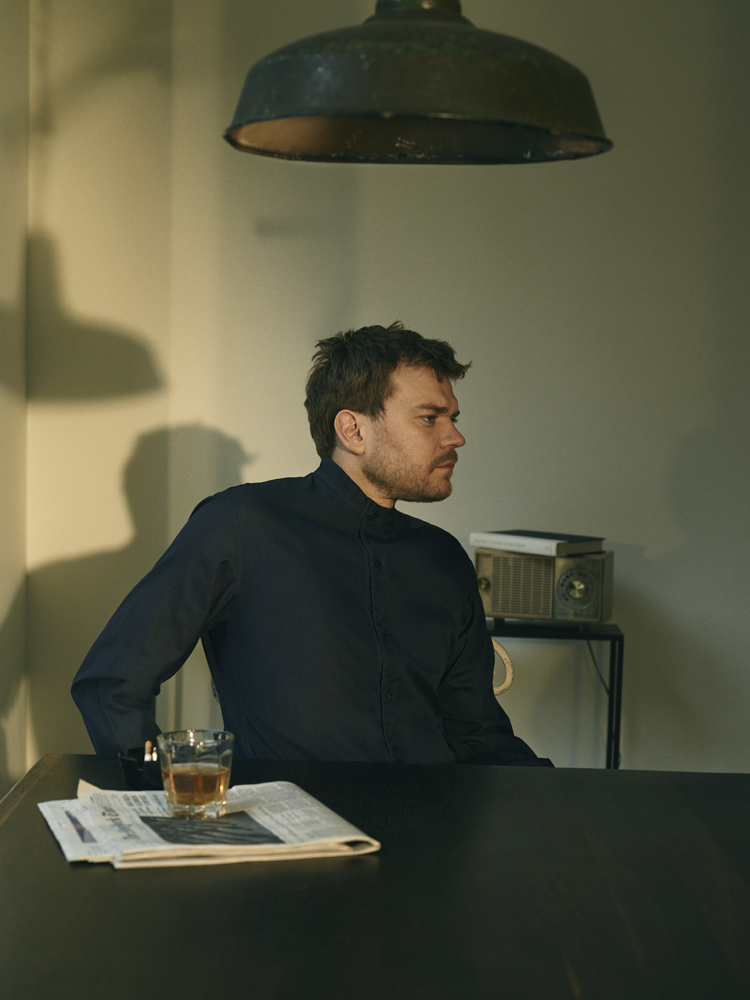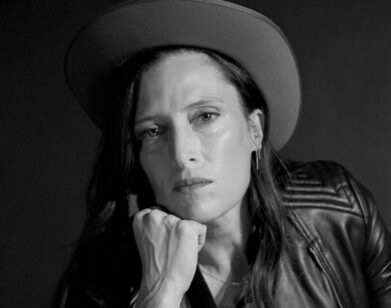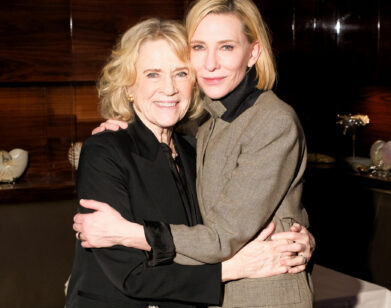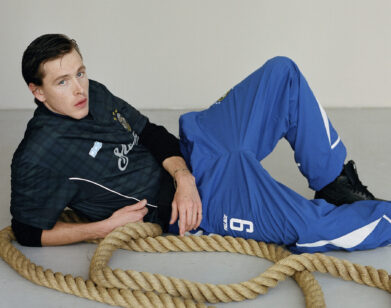Pilou Asbæk
PILOU ASBÆK IN NEW YORK, MARCH 2017. PHOTOS: MATTHEW SPROUT/EXPOSURE. STYLING: BERNAT BUSCATO. GROOMING: JESSICA ORTIZ FOR THE WALL GROUP USING SUNDAY RILEY. PROP STYLING: JAMES LEAR. STYLING ASSISTANT: ELIZABETH SOTO.
In Denmark, where he was born and raised, Pilou Asbæk’s career has been shaped by his collaboration with writer and director Tobias Lindholm. The two worked together on the prison drama R (2010), and it was Lindholm who originally recommended Asbæk for his breakout role as the Prime Minister’s calculating spin-doctor in the BAFTA- and Peabody-winning series Borgen. Of their four films together—they teamed up again for A Hijacking (2012), April 9th (2015), and A War (2015)—three of them have earned Asbæk Robert Festival nominations.
Now the actor, whose real name is Johan Philip Asbæk, is in the midst of going global: In 2016 he made his Game of Thrones debut as Theon Greyjoy’s nefarious long-lost uncle Euron and played Pontius Pilate in Ben-Hur. After appearing in The Great Wall earlier this year, he can currently be seen opposite Scarlett Johansson, Juliette Binoche, and Michael Pitt as Batou in Ghost in the Shell. The half-French 35-year-old has two more films in post-production: Woodshock, the first feature from Rodarte designers Laura and Kate Mulleavy, and The Guardian Angel with Josh Lucas.
EMMA BROWN: Were you really a clown in amusement park?
PILOU ASBÆK: Yeah, that was my first professional job. How the fuck would you know I was a clown in an amusement park?
BROWN: I was reading some of your interviews.
ASBÆK: Oh, I’ve said it already? Oh, man. I came to drama school [at Denmark’s National School of Theatre] in 2004 and I graduated in 2008, and my first professional job as an actor—I had done a film before, but I was still attending school at that time—was as a clown in an amusement park, in something called Bakken. People would throw beer cans at me and just harass me for a month. My mom came to see it and she started crying, because she thought, “This is the life my son’s going to have. He should have been a lawyer or a doctor.” Like the good children. But it’s going well.
BROWN: I know at drama school in the U.S., you have a showcase towards the end of your last year and the hope is that you get an agent from that. Is it the same in Denmark?
ASBÆK: No, you just hope to get a job when you finish school. The first two years you are not allowed to be seen by anyone; there are only eight students at school who can see and comment on your work. You don’t have any text at all; it’s all physical improvisation and stuff. Then you start working with text in your third year and with directors who are also students at the school. In the fourth year you do showcases. You do a couple plays where they have to switch you around—you play the father in one of the plays and then you play the lead in the other one. But I always—I don’t know why—got the weird uncle, or the guy who’d be in the back yelling and angry. I never got the real leads, which is kind of stupid because everyone should try it. But it was good for me. I became kind of humble by not.
BROWN: Were you hoping to do theater when you left?
ASBÆK: Yeah and I’m still doing theater when I get the chance to do it, but it’s very difficult, because right now I’m doing a TV show and a couple of films, so I don’t have time. In theater they want to put you on a contract a year in advance and I don’t really like that. That’s the reason why I became an actor—I like the freelance work. It’s interesting, I like not being told what to do still, and I have a job where people tell me exactly what to do, so maybe I don’t know myself as well as I want to. I think my last play I did was three years ago. I did a TV show called Borgen.
BROWN: Which was a huge hit.
ASBÆK: A huge hit all over the world. I signed on for two seasons and then they wanted to do a third one, and I thought it was a stupid idea because my character was already kind of developed—I’d finished him, I’d done him for two years, I didn’t want to do him anymore. So I said no to a third season so I could do theater, but I kind of regret it, because it was a great show. But the play was also good.
BROWN: You said that you did a film while you were still at school. Which one was that?
ASBÆK: I did a film called Worlds Apart about a Jehovah’s Witness. I was the love interest—the male lead—but the story was about the female lead, a young girl who is a part of this cult and she wants to break out. She meets a guy who has to help her. She has to find out who she is. It’s more like a coming of age story.
BROWN: Were you allowed to do that even though you were still at school? Or did you have to sneak out and not tell anyone?
ASBÆK: I had to ask my principal for permission, even though it was between the third and fourth year of school. He’s one of my best friend’s father, so I was like, “Pleaaase help me.” And he was like, “Okay, okay.” But normally you’re not allowed to. It’s frustrating, but it’s for the better. They want to keep you in a position where they can still protect you, but in this industry no one’s going to protect you except yourself. You’ve got to take care of yourself and you’ve got to get a great team around you. You’ve got to get people that you like and you want to continue your collaboration with. That’s the reason why most of the things I’ve done in Denmark have been with the same guys, and that’s why now, working in America, I try to find directors like Kate and Laura Mulleavy, who are generous and creative and full of energy and life, instead of doing Ben-Hur again, even though Ben-Hur was fun. The reason I did that film was because I wanted to try out a big-budget American film.
BROWN: What made you want to do Ghost in the Shell?
ASBÆK: Because I got the chance to work with Scarlett [Johansson] again. And I got the chance to work with Rupert Sanders, who is fucking incredible. He’s such a visionary man. What he’s created with Ghost in the Shell is astonishing. I just saw the film, it’s unbelievable. It’s one of the most beautiful films I’ve ever seen. It’s artistic, it’s got story, it’s got action, it’s got philosophy. And it makes me so happy that we have Scarlett Johansson and Juliette Binoche in the same film. It’s two strong women who discuss identity and life, and not sex and marriage and men. That’s so rare that there’s a big-budget American film that would actually discuss other subjects. I love Sex and the City, but it’s also wonderful that there’s something else other than Sex and the City.
BROWN: How do you get involved? You already knew Scarlett.
ASBÆK: I knew Scarlett from a Luc Besson movie called Lucy where we worked together for three days. I got to know her, but I didn’t get to know her very well. The scene was supposed to take three days, but we were there eight hours; we were very quick. She’s very efficient. But then in Ghost in the Shell, we got to work together for five, six months in Wellington and a couple of weeks in Hong Kong where we become friends. You’re there with your family and she’s there with her family, so you go out and you eat together. You discuss work, but after one week, how much work can you discuss? So you have to discuss other things, like politics and life—things that can feed your brain so you don’t become an acting zombie only thinking about your job and your work. It’s the most boring thing. What I like about acting is everything besides the acting. It sounds weird, but it’s the truth. I like preparation. I like having meetings with people and discussing character and story, because that’s where all the possibilities are. The moment you start to shoot, you just have to be efficient and then the day the movie’s over, it’s done. You’re out of it. Then you do it again, like, eight months later.
BROWN: But you don’t want to direct or write?
ASBÆK: I want to direct in Denmark. I married a writer, my best friend’s a writer, so I always wanted to be a writer. In my mind, I still think—and wish—that I’m going to be a journalist or a writer. That’s been my dream job my entire life. I was 20 when I found out that I could be an actor. I didn’t know it was a job; I just thought they were doing it for fun. I wanted to get this girl at school and all the fun girls were attending drama, so I thought, “Okay, I’ll do the same.” Then I had to do a speech, a monologue, and I’ll never forget it. I did it and everyone was like, “Dude, you’re not a fucking writer, you can’t write shit. You’re an actor!” And then my teacher pushed for it and I got into the national drama school. It was kind of an accident, which is now a good thing, I guess. But I still want to be a writer.
BROWN: There’s always time.
ASBÆK: Yeah, but I can’t spell. I can write on the computer and the computer spells the words for me.
BROWN: Exactly. Your mother is French. Did you grow up bilingual?
ASBÆK: I grew up in a very French family, but my dad is Danish and he didn’t want to speak French with us, so my mom kind of gave up on the French. The music of it is in me, but not the words yet. I was raised very strict—boarding schools. Maybe that’s the reason why I’m so sloppy in how I dress now.
BROWN: Well, do you think that’s why you want to be an actor? You wanted a job where they tell you what to do because you grew up with so many rules?
ASBÆK: More rules. But the good thing about rules is if you have to do an interview, and you make some rules for that interview, like, “I can only ask him about five years of his life or her life,” it narrows down your story. It’s the same thing with acting. In my profession, if I say, “These are the rules for this character,” all of the sudden, you create life. I remember when I was in grammar school, the teacher would always go, “You can write whatever you want to write.” And it completely locks you as an artist, because all of the sudden your creativity is not stimulated. The moment she tells you, or he tells you, “I want an essay on this Rembrandt painting,” you’re like, “Okay, great.” The creativity blossoms inside you. When I have to do my character, I make all these rules for how he should be and what’s possible and not possible until the first day of shooting. [Then] I let everything go, because the moment you shoot, you have to be completely free in your character. Each person you are portraying has to have the possibility to do everything. It’s weird that you make all these restrictions to let yourself be free.
BROWN: Has doing Game of Thrones changed your day-to-day life? Do people come up to you in the street?
ASBÆK: No, no. It’s a big hit and people are very happy about it, but I did, like, two small scenes in Season Six. I’ve got some cool scenes in what’s coming up and I hope that people appreciate what we’re trying to do with the character. It’s always difficult when he’s part of a big universe. You cannot live up to people’s expectations—the only expectations you should live up to are yours and your family’s. It gave me a boost, but I’ve done so many roles in Denmark, so many really demanding characters, that when I came on-board on Game of Thrones it felt like this amusement park. Everything was possible and all of the sudden you were hanging out with the Lannisters, or you would be with Kit [Harington]—all these guys who’ve you’ve seen for five, six years on telly and whose work you really admire. Game of Thrones is one of the biggest shows in the world, and I’ve been such a massive fan for so many years. It’s been so magical, but the moment I came in and became a part of the whole circus, the magical feeling kind of disappeared. Now I have seen all the tricks. I still love it, but I’m not watching it anymore.
BROWN: What are some of the rules you created for your character in Ghost?
ASBÆK: One rule was that the more [we progressed] through the entire film, the less movement I would do with the character. The reason why is that the original Ghost in the Shell is based on a manga, which is [static] drawings. The other one is animé, which is movement. I didn’t connect with the character when I saw the animé; I didn’t connect with Batou, I connected with the Major, Motoko. I saw it the first time when I was a teenager at the beginning of the millennium, and I had some difficulties with connecting with him. So I thought, “Go back to the bible. Go back to the original source.” That’s something I learned from my family, because they have a gallery, and a painting has a story, but it also has a history, and you have to understand its history to see the story. It’s the same thing with characters and with Ghost in the Shell. We’re telling a story, but the story has a history. So I started reading the manga and I found out that Batou is much younger than the guy in the animé—Batou in the animé was 15 years older than I am, and I didn’t want to age with makeup. So I had a long discussion with Rupert Sanders. But I’ll steal— because it is stealing—the inner soul, the warmth, the dry humor, the movement off Batou in the animé.
BROWN: So now you are traveling the world promoting this film.
ASBÆK: Yes, and it’s a great experience, I’ve never tried it before. But it’s hard because you’re just so tired. Then I’m the lost son returning because I haven’t done anything in Denmark the last three years. So when I come home, I’m coming home not as a changed man, but some of the innocence has disappeared.
BROWN: Do people sort of tease you about that: “You’ve left us for America”?
ASBÆK: No, because boys are very basic. If we get food, alcohol, and maybe cigarettes and occasionally some sex, we’re pretty cool. We’re pretty chilled. What you see is what you get. It’s not so many layers. Women are a little bit more complicated, which is why we keep falling in love with you all again and again and again and again. I love that, but I’m very grounded. Nothing’s changed so far, except my appetite for life.
GHOST IN THE SHELL IS OUT NOW.







